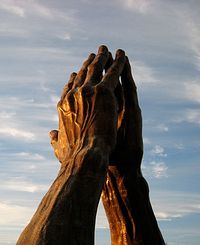SOURCE: Wilmington
 |
| Fr. Peter Robichau |
I shouldn’t be surprised by this.
I saw it coming several decades ago, but I didn’t really think that I would live to see it.
Here we are … it’s 2013, and national media outlets are reporting on the rapid growth of the demographic called the “Nones” – the 15 percent of Americans with no religious affiliation. This demographic also happens to be the third largest religious demographic in the world.
This is quite a paradigm change!
A once popular bumper sticker stated, “My karma ran over your dogma,” suggesting the superiority of a theology based on “what goes around comes around.” Now, decades later, we are trying to wrap our minds around the significance of Generation None, where karma doesn’t even seem to play a role.
Religious institutions that once stumbled to redefine themselves in a world that valued plurality over theological exclusivism now find themselves the unwitting victims of their inclusive messages. When everything is just fine, then nothing really matters.

|
| Praying hands statue in Tulsa, OK. Credit: Photo by C. Jill Reed, via Flickr, http://www.fotopedia.com/items/flickr-2221223106 |
In the Eastern Orthodox tradition, our liturgy emphasizes the mystery of God by proclaiming that he is, “Ineffable, inconceivable, invisible, beyond understanding, ever-existing and eternally the same,” and it finds great comfort in assurances that the experience of God is a mystery to those who receive him in faith.
The Orthodox Church also emphasizes the greatest divine commandment, which is to love (first God, and then our neighbors).
One could take these two teachings, and conclude that, to quote John Lennon, “All we need is love.” The Orthodox Church, however, takes these axioms, and places great emphasis on the fact that how and what we believe necessarily impacts our ability to experience the mystery of God by grace and to love as God loves.
Now, more than ever, when we are presented with faceless, dehumanized wars and drone attacks coordinated by “soldiers” who use video game-like joysticks in command centers far away, we need a theological standard to emphasize the value of life and the horror of death.
Now, more than ever, when economies are built on little more than mathematical algorithms and lightning fast computing platforms (and those few with access to these “tools” will acquire obscene wealth while poverty levels rise), we need a divine measure to hold our consciences in check.
Now, more than ever, when the world around us becomes increasingly “connected,” but people and families are terribly detached, we need God’s assistance to help us retain, or perhaps rediscover, the essence of our humanity.
And I believe that now, more than ever, we need a church that cares less about adapting to our ever-changing society and more about transforming our society with the good news that there is a God who cares deeply about every human being – a God who believes that we matter, even if we don’t believe that he does.
